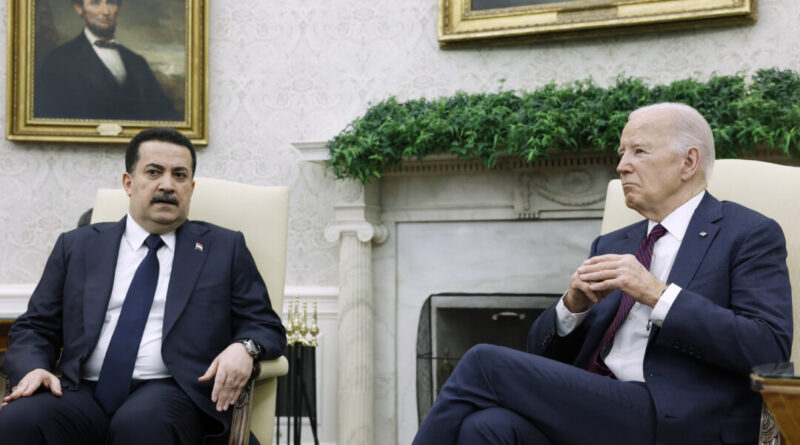President Biden meets with Iraqi Prime Minister amidst rising tensions in Middle East
President Joe Biden welcomed Iraqi Prime Minister Mohammed Shia al-Sudani to the White House on April 15.
President Biden said the relationship between the United States and Iraq was critical for the region and the world.
The president reaffirmed Washington is committed to Israel’s security, but also committed the United States to bringing about a ceasefire.
This was Mr. Al-Sudani’s first visit to the White House and first meeting with President Biden, during which they talked about the Strategic Framework Agreement and their ongoing effort to prevent a resurgence of ISIS in Iraq.
The two leaders also discussed financial reforms as well as progress toward the Middle Eastern nation’s energy self-sufficiency and modernization.
The president took no questions from the press.
“The United States is committed to Israel’s security. We’re committed to a ceasefire that will bring the hostages home and prevent any conflict from spreading beyond what it already has,” President Biden said during the meeting.
“We’re also committed to the security of our personnel and partners in the region, including Iraq.
“The partnership between Iraq and the United States is critical.”
Speaking through an interpreter, Mr. Al-Sudani told President Biden that the war against ISIS is the base of the U.S.-Iraq relationship, and victory was achieved by fighting together.
He also affirmed his nation’s commitment to the outcome of the Higher Military Commission discussions.
The Iraqi prime minister also shared his desire for a comprehensive long-term partnership between his nation and the United States, moving that relationship from security and military to an economical, educational, and environmental one.
However, cooperation between the United States and Iraq appears to have been strained in the past few months as U.S. forces face criticism for their strikes on Iran-backed groups within Iraq’s territory.
The next day, Iraqi army spokesman Yahya Rasool said the U.S.-led coalition had become “a factor for instability [that] threatens to entangle Iraq in the cycle of conflict.”
In calling for peace in Gaza during his White House visit, the prime minister said that his government is “very eager about stopping this war which claimed the lives of thousands of civilians, including women and children.”
But he made no mention of Israel.
“Our views may be divergent about what’s happening there in the region, but we agree certainly about the international law, the international humanitarian law, and the responsibility to protect the law of war.
“And we reject any aggression against the civilians, especially women and children,” Mr. Al-Sudani said.
“And we think if we kept silent about what’s happening, that we will establish a precedent that will be followed, whether it is bad or good precedent.”
During that meeting, both sides reflected on the historic achievements and sacrifices made in the fight against ISIS and the support of Iraqi stability, sovereignty, and unity. They agreed to provide assessments to set a timetable for transition.
Adam Morrow contributed to this report.





